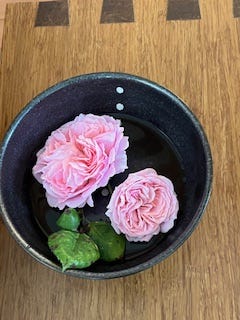My mother had the oddest method of teaching manners I’ve ever encountered. She would say to us four children as we raucously carried on at the dinner table, “How on earth do you think you are going to be invited to dinner at the Embassy if you can’t learn to behave? It’s really important to learn manners. Good manners will take you everywhere!” I was, what, eight years old? The other kids were younger.
Our natural response was, “Who cares?” or, “What’s the Embassy?” while the baby ignored everything but the food she was decorating her high chair with.
At the time, our family lived in Ottawa, which was studded with Embassies. We did know that the Embassy was a place our parents went to for really fancy parties. The concept of different countries each having their own Embassy wasn’t something the younger kids grasped.
My mother kept a globe of the world in the dining room and would eagerly show us different countries, for example, “See, here’s Great Britain,” which in my memory was coloured red. But the concept of an embassy got muddled into the Embassy, as if it were one grand building. Also, that’s how our mom spoke; it was always the Embassy. For my mom, good manners were one of the keys to a sparkly life.
My parents weren’t socialites; this business about going to embassies was a direct result of my dad’s job at the time. He was the assistant head of the National Gallery of Canada. His specialty was putting together interesting art shows, coming up with the idea for them and then tracking down which galleries had pieces they’d be willing to lend. I understood he had a real talent for putting memorable art shows together before I even knew what the word flair meant.
When the National Gallery featured an art show, depending on where the art was borrowed from, the embassy of the country which was featured—say, France—might put together a celebratory event at their embassy. Art galleries around the world were always borrowing from one another.
Mom would show us the invitations when they arrived in the mail, with fancy engraved cards. The recipients had to RSVP. “What does it mean?” my mom always asked us. And we’d chorus, “Everybody knows that! “Répondez s'il vous plaît.”
Depending on the formality of the event, our father would sometimes even rent a tuxedo for a do at the Embassy. This was before the advent of television, which is to say pretty much back with T. Rex and the pterodactyls. There was no internet—we didn’t have the huge numbers of visuals available to us that kids do now so we children were easily wowed.
It created awe in us to see our dad dressed in black tie and tails. And our mother! Her transformation seemed especially remarkable. She told us when she was growing up that she was a tomboy and the leader of a gang of boys. Later in life, as a mom of four, her usual look was rumpled, with slacks and an old shirt. But going out, oh my goodness. Who was this elegant woman wearing Desert Flower perfume, earrings and even makeup? When she kissed us good night before going to a reception at the Embassy she would be wearing an evening dress, heels and a teeny tiny evening purse that she used to sneak treats back to us.
Treats were by no means a regular thing; Mom had to be discreet. They were, however, key to teaching us manners. It took manners out of the realm of the theoretical, and just as if we were puppies, food kept us motivated. We would split a tiny French pastry wrapped in a napkin or maybe a fancy chocolate.
It’s not like we grew up remotely hungry, but speaking for myself, I was fascinated and greedy. What we ate at home was plain. Mom didn’t even bake cookies, so treats were special.
When I kissed my magically dressed-up parents goodnight, I felt like Cinderella getting left behind, albeit with a babysitter. A taxi would sweep them off and take them away, leaving us behind in the mundane world.
The next day, Mom would tell us the story of what had happened. Was it the stories of the food that had been served that made it mesmerizing? Or was it the idea of glittering grown-ups moving around inside palatial buildings like fairytale characters come to life?
So it was by this peculiar bait of talking about dinner at the Embassy, food treats and playing games about the right thing to say, that Mom got us to buy into the concept of manners.
Did we ever learn, at a place setting with multiple forks and knives, which to eat with first? Speaking for myself, I never had a meal fancy enough to know this might be an issue until well into the future! That’s when I thought of Mom then and went, Hmm, this is ground we could have covered. But I did as she had once instructed me, slid my eyes sideways and watched to see what implement my neighbour picked up.
One of the things Mom was clear about is that good manners are a way of putting the other person at ease. Courtesy costs naught, she often told us. All the way through school, my sister got compliments from her friends’ parents about her lovely manners.
Did I ever have dinner at the Embassy? Never! And this is perfectly alright: I love meals shared with friends and family, and run from events where I have to make polite small talk with strangers with whom I have nothing in common. I’m lucky enough to I live on Pender Island, a place small enough we enjoy a sense of community.
My brother did once have dinner at the Embassy; by all accounts (his wife’s), he acquitted himself with grace.
Courtesy itself is a lovely concept. It sets up parameters of respect between people. And maybe this was something my mother needed to reassure herself about, going into social situations where everyone else would be far richer or more powerful than she was. She at least had been brought up with beautiful manners.
When I think about my young mother waving her hands at the rowdy supper table, the memory makes me smile with great affection. “He hit me!” “She started it.” “That’s enough,” Mom would say. “Would you like to explain this to your father when he gets home?” Oops. The noise level would go down. The hitting would stop. “How do you expect to be invited to dinner at the Embassy if you don’t learn how to behave?
It was a great myth. I bought right into it. And in my experience, good manners really do take a person a long way.
How did your parents lean into you with that whole concept of manners?









Nikki, what a wonderful thing for you to say about my mom! I appreciate it and will pass it on to my family. I'm just sorry, though, as it sounds like your own mother hurt you.
In fairness, though, when my mom was enraged, she was a true terror.
Your mother was fantastic. I wished so often she was mine.